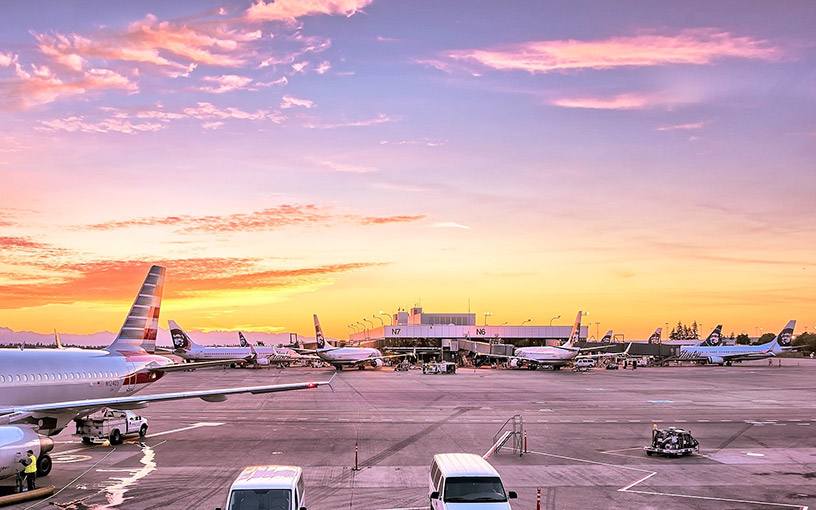Top 5 Tips to Prevent Jet Lag
There is nothing worse than arriving at your destination feeling exhausted and unable to concentrate. Getting off a long haul flight feeling nauseated, disorientated and generally just terrible, is very common.
Be reassured, this is a normal physiological response to travelling long distances and over multiple time zones.
Jet lag is the curse of international travellers, but it doesn't have to ruin the first few days of your holiday. By planning ahead and taking some extra measures, you can limit the amount of time it takes to get your sleep schedule back on track.
Skip ahead to find:

Don't like flying? Use our guide on how to survive your next long-haul flight!
What is jet lag?
Jet lag is a disruption to your sleep cycle and body clock, and also affects other bodily functions such as blood pressure, body temperature, thirst and hunger. Jet lag is a normal physiological response to travelling across time zones, but the body often requires a few days to adjust.
What are the symptoms of jet lag?
Common symptoms of jet lag include:
- Daytime fatigue
- Sleep disturbance
- Reduced alertness
- Headache
- Gastrointestinal upsets
The symptoms of jet lag can be influenced by the direction and timing of travel, in addition to the number of time zones crossed. Individual variability may also account for your ability to adapt at your new destination.
Суммы побольше тоже доступны, например, с помощью продукта https://kreditstore.com.ua/9000-grn/. Такой займ подходит для более серьёзных расходов: ремонт квартиры, покупка техники или поездка. Оформить его можно онлайн, без лишних документов и визитов в офис. Удобные сроки возврата делают кредит практичным инструментом для большинства клиентов.

Get a free quote for travel insurance today!
How can I avoid jet lag?
Check out our best tips below to help you beat the effects of jet lag and readjust to the new time zone faster.
Tip #1: Adjust your sleep schedule ahead of time
Trying to jump right in to your holiday will leave you exhausted, but if you have the time, try adjusting your sleep schedule before you leave.
Try to adapt to the new time zones before arrival. Adjust the wake and sleep times to gradually bring you in line with the normal sleep-wake times for the destination. When travelling eastward, this would involve having gradual earlier wake times (increase by 30-60 mins daily). This is easier than attempting to sleep at an earlier time.
It's also wise to book a day or two after you trip to readjust your sleep schedule before heading back to work. Going into the office feeling like you're still in a different time zone is going to make you less productive, and it will make it much more difficult to get back on track.
Tip #2: Keep hydrated and limit alcohol and caffeine consumption
Dehydration can make your jet lag symptoms worse. It's important to drink plenty of water and avoid high salt foods before and during your flight.
It's also a good idea to avoid (or at least limit) alcohol and caffeine on your flight, as well as the days before and after your flight. Both alcohol and caffeine lead to accelerated dehydration and result in poorer quality sleep, worsening the symptoms of jet lag.
If you feel like you need that burst of caffeine when you wake up in the morning, try tricking your body by having a warm beverage like green or herbal tea instead. An apple can also help you feel energised without affecting your sleep-wake schedule too much.
Tip #3: Eat at appropriate times
To accelerate realignment, gradually adjust meals to your new time schedule. When you'e on the flight, eat small light meals as this will help, too.
There is some evidence that a program of high protein meals and a period of fasting before arrival, followed by a high-protein meal eaten at the appropriate time for breakfast at the end destination may reduce the symptoms of jet lag.

Want to know which airline has the best food? Look no further than our guide to the best airline meals around the world!
Tip #4: Get some sunshine
Your body helps set its internal clock based on sunlight, and light is the major signal that shifts the sleep-wake cycle. That's part of the reason you wake up naturally when sun comes streaming in your window.
Для крупных целей подойдёт кредит на 18000 грн. Этой суммы достаточно для ремонта, покупки техники или поездки. Оформление занимает всего несколько минут, а деньги переводятся на карту в течение дня. Это практичный вариант для серьёзных расходов без лишних процедур.
The timing of light exposure can help you adjust to your new time zone. When preparing to travel west, expose yourself to light and exercise late into the evening. When travelling east, try and have a brisk morning walk.
Though you might feel like holing up in the dark when you are suffering through a bout of jet lag, the best thing you can do for yourself is get out there and soak up those rays. The fresh air and exercise will help, too.
Tip #5: Stay awake when you arrive
Depending on when your plane lands in your country of destination, it may be best to stay awake as long as possible. Even if you're exhausted, don't go to bed at your new destination until nightfall, so you can adjust your sleep schedule faster.
This means you must utilise your time in transit to sleep. For example, if you're taking an overnight trip from Sydney to Los Angeles, and you leave Sydney at night and arrive in LA in the morning, the best thing to do is try to sleep as much as possible on the plane.
Jet lag isn't the only thing that can set back your trip across time zones! Consider protecting yourself from unforeseen expenses with a comprehensive travel insurance policy. See our travel insurance benefits and don't forget to get a free travel insurance quote.
Material on this website is provided for informational purposes only. It is general information and discussion about medicine, health and related subjects may not apply to you as an individual, and is not a substitute for your own doctor’s medical care or advice. The words and other content provided on this website, and in any linked materials, are not intended and should not be construed as medical advice. If the reader or any other person has a medical concern, they should consult with an appropriately licensed physician or other health care worker. Nothing contained on the website is intended to establish a physician-patient relationship, to replace the services of a trained physician or health care professional, or otherwise to be a substitute for professional medical advice, diagnosis, or treatment. The views and opinions expressed on this website have no relation to those of any academic, hospital, practice or other institution with which the authors are affiliated. They do not necessarily reflect the opinions of Cover-More Insurance Services Pty Ltd. Never disregard medical advice or delay seeking medical care because of something you have read on or accessed through this website. If you think you may have a medical emergency, call your doctor or emergency services immediately.